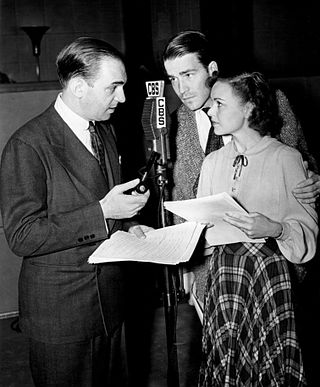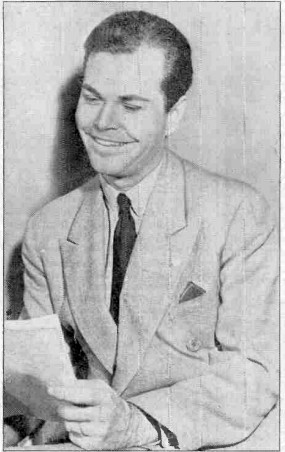Related Research Articles

The Mutual Broadcasting System was an American commercial radio network in operation from 1934 to 1999. In the golden age of U.S. radio drama, Mutual was best known as the original network home of The Lone Ranger and The Adventures of Superman and as the long-time radio residence of The Shadow. For many years, it was a national broadcaster for Major League Baseball, the National Football League, and Notre Dame Fighting Irish football. From the mid-1930s and until the retirement of the network in 1999, Mutual ran a highly respected news service accompanied by a variety of popular commentary shows. In the late 1970s, Mutual pioneered the nationwide late night call-in talk radio program, introducing the country to Larry King and later, Jim Bohannon.

WKNR – branded as 850 ESPN Cleveland – is a commercial sports radio station licensed to Cleveland, Ohio, serving Greater Cleveland. Owned by Good Karma Brands, WKNR is the Cleveland affiliate for ESPN Radio and the AM flagship station for the Cleveland Browns Radio Network; the Cleveland affiliate for the Ohio State Sports Network, and the radio home of Je'Rod Cherry and Tony Grossi. The WKNR studios are currently located in the East Bank of The Flats in Downtown Cleveland, while the station transmitter resides in the Cleveland suburb of North Royalton. In addition to a standard analog transmission, WKNR is available online.

KGBT-TV is a television station licensed to Harlingen, Texas, United States, serving the Lower Rio Grande Valley as a primary Antenna TV owned-and-operated station and a secondary MyNetworkTV affiliate. It is owned by Nexstar Media Group alongside Brownsville-licensed dual NBC/CBS affiliate KVEO-TV. The two stations share studios on West Expressway in Harlingen; KGBT-TV's transmitter is located in La Feria, Texas.
Gang Busters is an American dramatic radio program heralded as "the only national program that brings you authentic police case histories." It premiered on January 15, 1936, and was broadcast over 21 years through November 27, 1957.

Murder Is My Hobby is an American radio mystery program that was broadcast on Mutual in 1945–1946. The 30-minute program debuted on October 14, 1945, and ended on July 14, 1946. It was sponsored by Mendaco.
The Colgate Sports Newsreel was a radio program focusing on sports. It has been called "one of the most successful and most listened-to shows in radio history" and "one of radio broadcasting's most entertaining and engaging programs." However, much of the information reported as fact was actually fiction.
Hollywood Hotel is an American radio program that was broadcast in the 1930s. It featured Hollywood stars in dramatized versions of then-current movies and "helped to make Hollywood an origination point for major radio programs." Radio historian John Dunning called the program, sponsored by Campbell Soup Company, "the most glamorous show of its time." The program was the inspiration for the 1937 Warner Brothers movie of the same title, which featured Louella Parsons as herself.

The Adventures of Ellery Queen was a radio detective program in the United States. Several iterations of the program appeared on different networks, with the first one broadcast on CBS on June 18, 1939, and the last on ABC on May 27, 1948.
The Saint was a radio adventure program in the United States that featured a character created by author Leslie Charteris. As the program's introduction said, The Saint, was "known to millions from books, magazines, and motion pictures." Several versions of the program appeared on different networks.

For the television series of the same name, see The Silver Theatre.

Chick Carter, Boy Detective is a 15-minute American old-time radio juvenile crime drama. It was carried on the Mutual Broadcasting System weekday afternoons from July 5, 1943 to July 6, 1945.
Claudia and David is an American old-time radio drama. One version was broadcast on CBS July 4, 1941 – September 26, 1941 and another was syndicated in 1947.
The Court of Human Relations is an American old-time radio human-interest program, pioneering the popular judicial genre that would later transform into televised entertainment. It was broadcast on NBC, CBS, and Mutual at various times, beginning January 1, 1934, and ending January 1, 1939. Sometimes referred to as True Story Court of Human Relations, not only was it radio's first courtroom series, but it was "one of the first sponsored programs ever carried on CBS."
The Court of Missing Heirs is an American old-time radio human interest drama. It was broadcast on CBS October 11, 1937 – September 29, 1942, and on ABC March 31, 1946 – April 6, 1947. It also went by the titles The Board of Missing Heirs and Are You a Missing Heir?.
Empire Builders is an American old-time radio Western. It was broadcast on NBC-Blue from January 14, 1929, to June 22, 1931. The reference book Radio Rides the Range: A Reference Guide to Western Drama on the Air commented, "This may have been the first western drama on radio; it certainly was one of the most unique."

The Dinah Shore Show was a title applied—in some cases specifically and in other cases generically—to several radio musical programs in the United States, some of which had other distinct titles as indicated below. Singer Dinah Shore starred in the programs, some of which were broadcast on the Blue Network, while others were on CBS or NBC.
The Fred Waring Show is an American old-time radio musical variety program. It was broadcast in a variety of time slots from February 8, 1933, until October 4, 1957, and was heard at different times on ABC, CBS, NBC, and the Blue Network. The program was sometimes called Chesterfield Time or Pleasure Time.
Hop Harrigan is an American old-time radio juvenile adventure program. It was broadcast on ABC from August 31, 1942, until August 2, 1946, and on Mutual from October 2, 1946, until February 6, 1948. General Foods began sponsoring the program on October 2, 1944; it had previously been unsponsored.

Howie Wing is an American old-time radio juvenile aviation adventure serial. It was syndicated by the World Broadcasting System and distributed initially to stations in Canada, beginning on January 31, 1938. The Don Lee Network began carrying it in the western United States on February 12, 1938. The program was broadcast weekdays on CBS from October 3, 1938, until June 30, 1939.
The Judy Canova Show is an American old-time radio comedy-variety program. It was broadcast on CBS July 6, 1943 – June 27, 1944, and on NBC January 13, 1945 – June 30, 1951, and December 29, 1951 – May 28, 1953. Each version differed from the others to some extent, although comedy and music remained the focal points. The program is notable for being the medium in which Judy Canova found her greatest success.
References
- 1 2 Dunning, John (1998). On the Air: The Encyclopedia of Old-Time Radio (Revised ed.). New York, NY: Oxford University Press. pp. 131–132. ISBN 978-0-19-507678-3 . Retrieved 2019-09-19.
- 1 2 "Agencies and Representatives" (PDF). Broadcasting. May 1, 1937. p. 62. Retrieved 4 February 2017.
- 1 2 3 4 5 6 Cox, Jim (2002). Radio Crime Fighters: Over 300 Programs from the Golden Age. McFarland. pp. 65–66. ISBN 978-0-7864-4324-6.
- ↑ Terrace, Vincent (1999). Radio Programs, 1924-1984: A Catalog of More Than 1800 Shows. McFarland & Company, Inc. ISBN 978-0-7864-4513-4. P. 59.
- 1 2 Robson, William N. (November 1, 1934). "Using the Police as a Radio Sales Force" (PDF). Broadcasting. p. 11. Retrieved 4 February 2017.
- 1 2 "Merchandising & Promotion" (PDF). Broadcasting. November 15, 1936. p. 78. Retrieved 4 February 2017.
- ↑ "New Production Firm" (PDF). Broadcasting. January 15, 1939. p. 73. Retrieved 4 February 2017.
- ↑ "Gruen Watch Spots" (PDF). Broadcasting. March 1, 1939. p. 81. Retrieved 4 February 2017.
- ↑ "Liebmann Using 8" (PDF). Broadcasting. May 15, 1939. p. 68. Retrieved 4 February 2017.
- ↑ "Ford Dealer Discs" (PDF). Broadcasting. February 15, 1940. p. 44. Retrieved 5 February 2017.
- ↑ "Program Award" (PDF). Broadcasting. January 1, 1939. p. 26. Retrieved 4 February 2017.